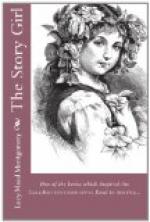Cecily, dear heart, sent most of hers to the hospital in town, and no doubt gathered in therefrom dividends of gratitude and satisfaction of soul, such as can never be purchased by any mere process of bargain and sale. The rest of us ate our apples, or carried them to school where we bartered them for such treasures as our schoolmates possessed and we coveted.
There was a dusky, little, pear-shaped apple—from one of Uncle Stephen’s trees—which was our favourite; and next to it a delicious, juicy yellow apple from Aunt Louisa’s tree. We were also fond of the big sweet apples; we used to throw them up in the air and let them fall on the ground until they were bruised and battered to the bursting point. Then we sucked on the juice; sweeter was it than the nectar drunk by blissful gods on the Thessalian hill.
Sometimes we worked until the cold yellow sunsets faded out over the darkening distances, and the hunter’s moon looked down on us through the sparkling air. The constellations of autumn scintillated above us. Peter and the Story Girl knew all about them, and imparted their knowledge to us generously. I recall Peter standing on the Pulpit Stone, one night ere moonrise, and pointing them out to us, occasionally having a difference of opinion with the Story Girl over the name of some particular star. Job’s Coffin and the Northern Cross were to the west of us; south of us flamed Fomalhaut. The Great Square of Pegasus was over our heads. Cassiopeia sat enthroned in her beautiful chair in the north-east; and north of us the Dippers swung untiringly around the Pole Star. Cecily and Felix were the only ones who could distinguish the double star in the handle of the Big Dipper, and greatly did they plume themselves thereon. The Story Girl told us the myths and legends woven around these immemorial clusters, her very voice taking on a clear, remote, starry sound as she talked of them. When she ceased, we came back to earth, feeling as if we had been millions of miles away in the blue ether, and that all our old familiar surroundings were momentarily forgotten and strange.
That night when he pointed out the stars to us from the Pulpit Stone was the last time for several weeks that Peter shared our toil and pastime. The next day he complained of headache and sore throat, and seemed to prefer lying on Aunt Olivia’s kitchen sofa to doing any work. As it was not in Peter to be a malingerer he was left in peace, while we picked apples. Felix alone, must unjustly and spitefully, declared that Peter was simply shirking.
“He’s just lazy, that’s what’s the matter with him,” he said.
“Why don’t you talk sense, if you must talk?” said Felicity. “There’s no sense in calling Peter lazy. You might as well say I had black hair. Of course, Peter, being a Craig, has his faults, but he’s a smart boy. His father was lazy but his mother hasn’t a lazy bone in her body, and Peter takes after her.”




